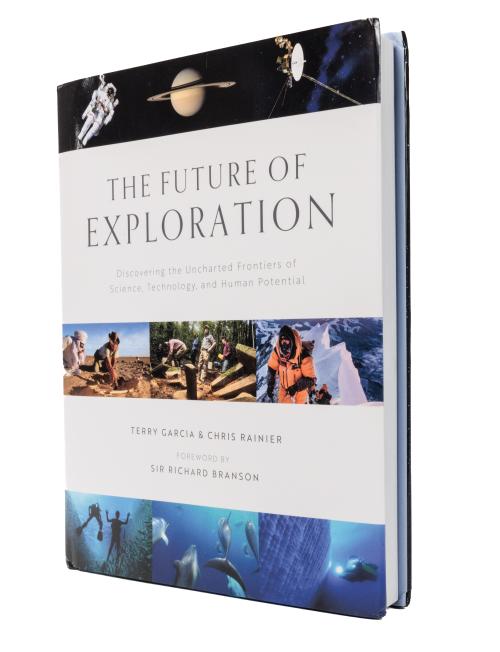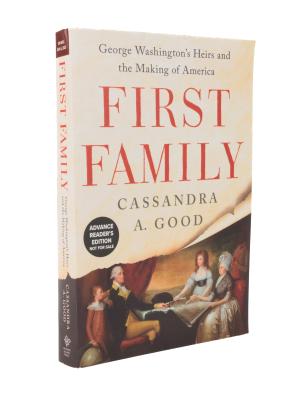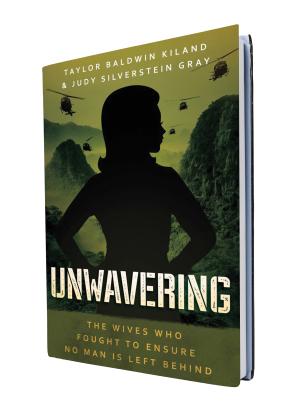Bookshelves
Bookshelves
Pushing the Boundaries of Knowledge
A new book from former longtime National Geographic executive Terry Garcia, J.D. ’80, examines the future of exploration through essays from leading scientists, researchers and adventurers.
Whether it’s outer space, the ocean, understanding animal species or uncovering the mysteries of past civilizations, we’ve only begun to explore. And the 21st century, thanks largely to leaps in technology, promises to exponentially further human knowledge.
In “The Future of Exploration: Discovering the Uncharted Frontiers of Science, Technology, and Human Potential” (Earth Aware Editions, 2023), Garcia and his co-author, National Geographic photographer Chris Rainier, are joined by more than 35 of the world’s top explorers and scientists to discuss the future of exploration. Contributors include Jane Goodall, Richard Branson, Bob Ballard, Louise Leakey, Zahi Hawass and Sylvia Earle.
“GW Magazine” talked to Garcia about his understanding of exploration, what the future bodes and why he and Rainier are donating the book’s profits to fund early-career researchers.
Q: What does exploration mean to you?
A: My definition of exploration is very broad. Exploration is any time, any way and anyone who might be pushing the boundaries of knowledge. It can be the pith-helmeted explorer stereotype, but it also might be a 21st-century educator who is preparing the next generation. In the book, we have a mix of people and disciplines. In exploration, sometimes it’s not just finding something new; sometimes it’s new eyes seeing the familiar from a different perspective.
Q: You write in the book that the 21st century will be the greatest age of exploration in human history. Why?
A: In good part it’s because of technology, which is providing the keys to unlock doors that we had assumed were permanently closed to us or, in some cases, doors we didn’t even know existed. In many cases, we’ve only just begun to explore. Take the ocean, for example. We’ve explored maybe 5 percent. We think there may be 2 million species of plants and animals in the ocean, but we don’t really know.
We also showcase in the book a new generation of scientists, explorers and researchers who are going to be assuming the roles of leaders in their respective fields, people who are from different regions and ethnicities and have different perspectives. That is going to provide us with new insights into many disciplines, whether it’s conservation, biology or archaeology.
Another thing that’s driving exploration is a sense of urgency propelled by climate change and the need to study and understand systems, organisms, cultures, languages before they’re gone. Many of the things that make this planet such an interesting, amazing, beautiful place are under threat.
Q: What do you hope readers will take away?
A: We hope they come away knowing that there are people like the contributors in our book who are leaders in various scientific fields willing to bear unimaginable hardships to expand the boundaries of our knowledge. It’s also our hope that readers develop a deeper understanding of the critical role of exploration in our lives and experience the excitement that goes along with it. And finally, we would like readers to come away with hope. We face many challenges, but here’s the good news: We know what needs to be done, and we know how to do it. It’s just a matter of will. To me, that’s a hopeful message, because we do have the ability to determine our destiny.
Q: You’re donating the book’s profits to fund early-career scientists and explorers. Why was it important to do that?
A: Large funding organizations tend to be conservative. They want certainty or near certainty of results. The people we want to fund have a credible hypothesis, but we don’t require the level of proof that, say, the National Science Foundation does. What’s the point of exploring if you already know the answer?
– Rachel Muir
“First Family: George Washington’s Heirs and the Making of America” (Hanover Press, 2023)
By Cassandra A. Good, B.A. ’04, M.A. ’05
While George Washington famously had no biological children of his own, he helped raise Martha Washington’s children as well as her four grandchildren through her son John Parke Custis. Good, a historian, examines America’s first “First Family,” Washington’s role as a father figure and the complicated legacy of the Custis family who depended on slave labor and used Washington to enhance their own power and status. “We continue to see George Washington as the father of our country, but few Americans know about the children he raised,” writes Good. “As enslavers committed to the American empire, the Custis family embodied the failures of the American experiment that finally exploded into civil war—all the while being celebrities in a soap opera of their own making.”
“A Part of the Heart Can’t Be Eaten” (Duke University Press, 2023)
By Tristan Taormino, M.P.H. ’23
In this no-holds-barred memoir, Taormino, a sex educator, filmmaker and podcast host, writes about the influence that an “extraordinary queer father-daughter relationship” had on her coming of age and queer identity as well as the pain of losing her father, Bill Taormino, to AIDS in the 1990s. “He was my best friend, my mentor, my teacher,” she writes. “He instilled in me a belief that drives me: I can do anything I set my heart to, and I can make this world better for people like us.” Weaving together excerpts from her father’s unpublished memoir, she reflects on the bonds, losses and mental health struggles that have defined her.
“Unwavering: The Wives Who Fought to Ensure No Man Is Left Behind” (Knox Press, 2023)
By Judy Silverstein Gray, M.P.H. ’15, and Taylor Baldwin Kiland
Gray and Kiland, both veterans, highlight the resilience and determination of a group of military wives in the 1960s, an era when women were often denied basic financial rights and military wives were warned to keep quiet. Against the backdrop of antiwar protests and the civil rights movement, the authors recount the stories of women who refused to remain silent when their husbands were declared missing in action during the Vietnam War. Sybil Stockdale, Candy Parish, Pat Mearns, Carol McCain and their fellow military wives became accidental activists, uniting to raise awareness about the plight of their captive or missing spouses.
“Cosmonaut: A Cultural History” (University Press of Florida, 2023)
By Cathleen S. Lewis, Ph.D. ’08
Lewis, a curator at the Smithsonian National Air and Space Museum, explores how the image of the Soviet Cold War hero, the “cosmonaut,” emerged in the 1950s and has evolved in the decades since. After the dissolution of the Soviet Union, Lewis writes, “the Russian population experienced the stress of choosing between nostalgia for a romantic and hopeful past and a need to blame someone for the failure to fulfill the promises of postwar life. As a result, two images of the cosmonaut exist today—that of the hopefulness of youth and that of the forlorn victim of a cynical state.”
“To a High Court, Five Bold Law Students Challenge Corporate Greed and Change the Law” (Friesen Press, 2023)
By Neil Thomas Proto, M.A. ’69, J.D. ’72
In fall 1971, five GW Law students created the Students Challenging Regulatory Agency Procedures (SCRAP) to address the corporate greed of the nation’s railroads and the failure of the government to protect the environment. Drawing on contemporaneous notes and transcripts, Proto, the group’s chair, details SCRAP’s eight-month legal fight that ultimately reached the Supreme Court. “Providing definition in facts and in crafting legal arguments for a controversy that led to the Supreme Court of the United States is a special experience in law. It is uniquely so for a law student,” writes Proto. “Yet that is precisely what we did, in our own name, in an era of tumult, especially in the nation’s capital.”
Photography: William Atkins








